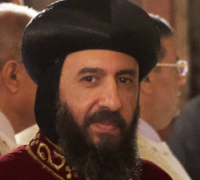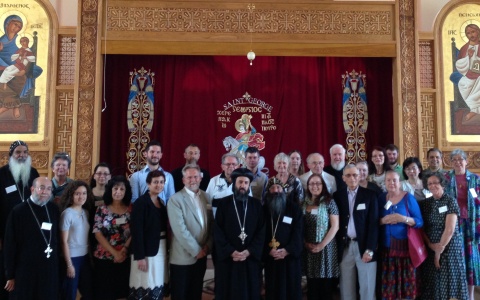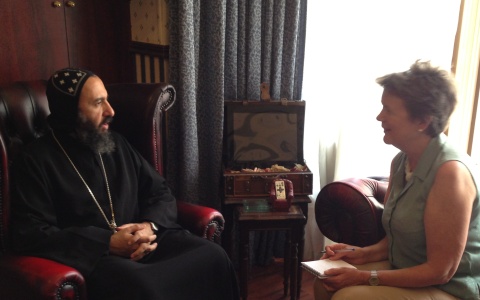'Phenomenally skewed': UK's top Copt slates media coverage of the Egyptian revolution
by - 23rd July 2013
 His Grace Bishop Angaelos, General Bishop of the Egyptian Coptic Church in Britain has accused the Western media of 'horrendous' reporting of the recent ousting of President Morsi.
His Grace Bishop Angaelos, General Bishop of the Egyptian Coptic Church in Britain has accused the Western media of 'horrendous' reporting of the recent ousting of President Morsi.
Following his speech to the Anglican Synod in York on 9 July, Bishop Angaelos who reports direct to the Pope in Cairo, told Lapido in an exclusive interview that the US media in particular had given a ‘phenomenally skewed angle’ of events.
Their coverage had treated Egypt as a war zone, misrepresented anti-Morsi protests as pro-Morsi and withheld facts that would have provided an objective picture.
Most damning of all, he said: ‘The media is trying to direct events rather than report them’.
 Bishop Angaelos made his remarks after the launch of the Second International Symposium on Coptic Culture: Past, Present, and Future running over three days at the impressive Cathedral of St George in Stevenage in Hertfordshire, UK on Monday (22 July).
Bishop Angaelos made his remarks after the launch of the Second International Symposium on Coptic Culture: Past, Present, and Future running over three days at the impressive Cathedral of St George in Stevenage in Hertfordshire, UK on Monday (22 July).
Scholars from 10 countries heard papers given by Egyptian Muslim and Coptic specialists on a subjects ranging from wine-making under the Fatimids, to pre-Conquest fashion trends among aristocratic women, to present-day persecution.
Bishop Angaelos is keen to use the current spotlight on Egypt to demonstrate both the contribution since the very beginning of Christianity to the country, and recover a sense of the old consensus between the faiths.
‘This intolerance of the community is something new,' he told Lapido. 'It should not be allowed to grow.
'During the past regime there has been no active programme of social cohesion. Some people will tell you that there was an active programme of divide and conquer during the Mubarak years. It makes the state stronger, they argue.
‘But this has not been a Coptic or Christian revolution but an Egyptian revolution. It was wonderful to see Egyptian flags in Tahrir Square.’
Bishop Angaelos said coachloads of Copts would stream into monasteries all over Egypt to celebrate public holidays such as the 6 October military victory, attended by President Morsi last year.
‘It’s an Egyptian revolution. We need to move away from this Christian/Muslim thing. If you mean Coptic as Egyptian, then yes, it was Coptic! [Copt is the ancient word that was corrupted to become Egypt.] It means that people are looking beyond religion and are looking at social mobility, at power, at the economy.’
 Bishop Angaelos who was born in Sydney, Australia, presides over the UK's Coptic Church which is a member of the Council of Oriental Orthodox Churches in the UK. He travels to Egypt regularly for Synods, most recently just a month ago.
Bishop Angaelos who was born in Sydney, Australia, presides over the UK's Coptic Church which is a member of the Council of Oriental Orthodox Churches in the UK. He travels to Egypt regularly for Synods, most recently just a month ago.
He offers four reasons for the survival of the Church, which at around 10million people, is the largest single Christian presence in the Middle East.
- Strong identity through historically verifiable associations with Christ. ‘Egypt is blessed by having been a place of refuge for Christ and the Holy Family.' [They were escaping the persecution of Herod.]
- A ‘really treacherous history of persecution and martyrdom and that’s made us strong’. The Church dates its calendar from the persecutions of the Emperor Diocletian in 248 in honour of up to a million martyrdoms.
- The monastic movement. ‘A prayerful existence in the middle of society. Monasteries are a place of refuge until today.’
- A distinct division of the church and state. ‘It is meant to be salt and light, to empower people’ He said it remained as ‘a moral base’ and did not get involved as an institution in politics. Individuals however should speak up about misrule, vote and be involved at every level, but not as priests or monks, the Bishop added.
He was much more hopeful about the future than he had been in January 2011 when the first revolution began. This was despite the recent killing of a Coptic priest in Sinai, and horrific acts of violence in some remoter villages.
The revolution indicated that ordinary people – 30 million of whom are thought to have taken to the streets – were 'less naive' than they had been, and no longer believed everything said to them, he said.
The Muslim Brotherhood’s ineptitude and partisanship had hit the poor the hardest. ‘Egypt had plummeted into such a state of mismanagement and financial crisis that people had to react.
‘Egypt ground to a screeching halt. Foreign investment was nil.
‘On the day 100 investors were being brought in to look at opportunities, was that the time for protesters to scale the walls and take down the flag on the US Embassy?
'Tourism, our biggest earner, was down to 20 per cent of what it had been.'
He said resorts had closed down, taxi drivers, cleaning staff, hotel staff could not work. 'It hit the poor. None of this was properly reported.'
Egypt was very different from other Middle East countries, he said. ‘This is no Algeria, Libya, Syria. The make-up of the people is very different. But western media tried to have a lowest common denominator attitude.
‘They called a mosque in suburban Cairo a "make-shift field hospital". The images that came to mind with this terminology were of Iraq and Syria.
‘It’s phenomenal how this was such a skewed angle.’
- Log in to post comments
